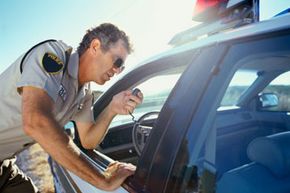From Andy Taylor to Andy Sipowicz, television has been a popular beat for cops. Shows featuring law enforcement have been around almost as long as TV itself, and their enduring popularity has left indelible marks on the public conscience. For example, it's practically impossible not to whistle along with the theme song from "The Andy Griffith Show." And since "Hawaii Five-0" premiered in 1960, "book 'em, Danno" has become as iconic as any line uttered in the line of duty.
But has the popularity of these shows (according to tv.com, three of the top ten programs currently on TV are police dramas, a better representation than even bed-hopping doctors) affected how people view police? After all, these programs are, ideally, the only exposure average, law-abiding citizens have with law enforcement. What expectations, if any, do they set? And how can cops be smart enough to solve crimes in an hour and also be so good looking?
Advertisement
On average, Americans spend more than 4 hours in front of the TV every day, witnessing 200,000 dramatized acts of violence by the time they reach the age of 18 [source: Herr]. Before we discuss how these shows impact our perception of law enforcement, let's acknowledge that the inverse is also true: Our own sense of morality is parroted back to us through not only cop shows, but also virtually all content piped through the tube. The overriding theme in most programming is the triumph of good over evil [source: Curry]. Even reality shows cast participants to meet the stereotypes of hero and villain.
But cops shows are particularly dramatic, with violent crime getting top billing over less interesting but far more frequent transgressions like property damage, theft and fraud. This overrepresentation of violence on television has given rise to the mean world syndrome, which results when a steady stream of intense, violent and threatening programming creates an artificially heightened sense of danger [source: Curry].
This mentality affects our view of police officers by emphasizing their role of protector. And while this is of course their job, it's an unrealistic expectation to think we'll always be guarded from life's worst-case scenarios.
In the next section, we'll talk more about how cop shows can overinflate our expectations of law enforcement.
Advertisement



